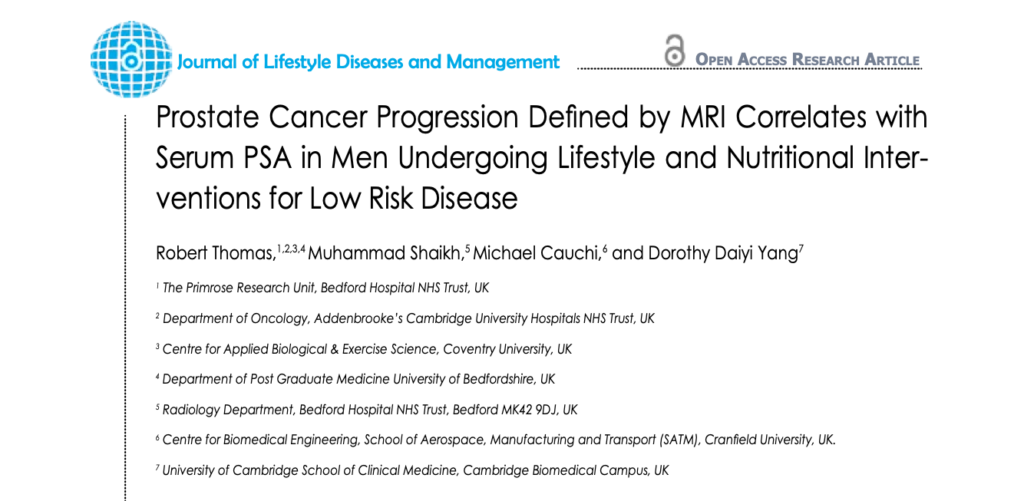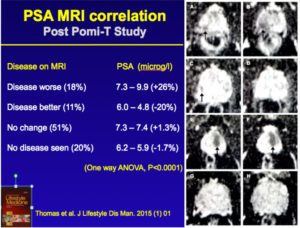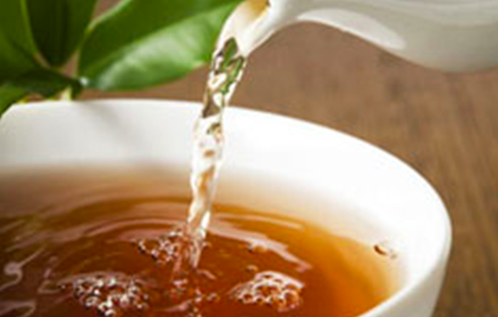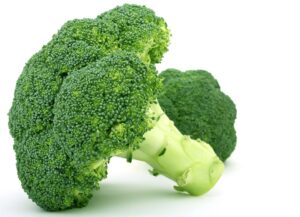
 A second evaluation has taken place involving men who have continued to take pomi-t post trial. It specifically addressed the issue of of whether PSA correlated with underlying changes in Cancer size seen on MRI. It involved men followed for up to 2 years on active surveillance.
A second evaluation has taken place involving men who have continued to take pomi-t post trial. It specifically addressed the issue of of whether PSA correlated with underlying changes in Cancer size seen on MRI. It involved men followed for up to 2 years on active surveillance.
The results, as shown in the adjacent picture, should a 100% correlation between PSA and underlying disease indicating that the PSA effect on the main Pomi-t trial was unlikely to be just a chemical effect but related to actual prostate cancer itself

Oral presentation at ASCO 2020 https://meetinglibrary.asco.org/record/189372/abstract
Full paper: Thomas et al, BJN 2022; 128, 653-8
Background:
 The popular beverage tea, brewed from infused leaves of camellia sinesis, contains non-phytoestrogenic polyphenols such as flavonoids, anthocyanidins, flavanols (epigallocatechin gallate); phenolic acids (ellagic acid) and stimulants (caffeine, theophylline). Laboratory studies report tea promotes antioxidant enzyme formation, slows cancer cell proliferation and unblocks apoptosis. Clinically, the Pomi-T randomised control study reported tea extract (along with three other foods) reduced PSA progression in men with prostate cancer1. Evidence of prostate cancer prevention, however, from prospective cohort data is conflicting with one recent study even implying an increased risk2.
The popular beverage tea, brewed from infused leaves of camellia sinesis, contains non-phytoestrogenic polyphenols such as flavonoids, anthocyanidins, flavanols (epigallocatechin gallate); phenolic acids (ellagic acid) and stimulants (caffeine, theophylline). Laboratory studies report tea promotes antioxidant enzyme formation, slows cancer cell proliferation and unblocks apoptosis. Clinically, the Pomi-T randomised control study reported tea extract (along with three other foods) reduced PSA progression in men with prostate cancer1. Evidence of prostate cancer prevention, however, from prospective cohort data is conflicting with one recent study even implying an increased risk2.
Method: We analysed 25,097 men within the intervention arm of the 155,000 participant PLCO screening trial. Histological confirmed cases of prostate cancer were reported in 3,088 men (12.3%) during the 11.5 year follow up. Tea consumption was assessed with a food frequency questionnaire (FFQ). Baseline characteristics were compared between groups using Chi-square and Kruskal-Wallis tests. Cox regression models were used to assess the association between tea intake and prostate cancer incidence.
Results: Overall tea consumption was associated with a significantly lower risk of prostate cancer (p=0.009). More precisely, the participants in the highest third of consumption group had a significantly lower risk compared to those in the lowest third (HR 1.16 (CI 1.05-1.29, p=0.004). This pattern persisted with adjustments for age, sex, race and education level (p=0.034), family history of cancer (p=0.037). Those who never drank tea, had no increased risk of prostate cancer compared to other groups (p=0.501).
Conclusion: Among tea drinkers, this data revealed a positive association between drinking tea and a reduced risk of prostate cancer. The study revealed that for every 500g of tea drunk (about two cups) there was a 3% lower risk of prostate cancer. This data supports the inclusion of tea in the blend for pomi-t and consideration of future prospective intervention studies investigating the role of tea as part of a prostate cancer prevention programme.
References
- Thomas et al. The NCRN Pomi-T RCT. Prostate cancer & prostatic diseases (2014), 2,180.
- Reger et al. Dietary isoflavones and prostate cancer risk. Int J. Cancer (2017), 142; 4, 719.
Dietary intake of broccoli and the risk of cancer in the Prostate, Lung, Colorectal and Ovarian Cancer (PCLO) Screening Trial
Robert Thomas1,2,3, Alex McConnachie4, Bethany Stanley4, Madeleine Williams2
The Primrose Lifestyle Research Unit, Bedford Hospital. Dept. of Oncology, Addenbrookes’ Hospital NHS Trust, Hills Rd, Cambridge CB2 2QQ. School of Sport Science and Physical Activity, Institute for Sport and Physical Activity Research University of Bedfordshire. Institute of Health and Wellbeing, College of Medical, Veterinary and Life Sciences, Robertson Centre for Biostatistics, University Avenue, University of Glasgow, Glasgow G12 8QQ
Presented at ASCO 2020 https://meetinglibrary.asco.org/record/189597/abstract
 Background: The cruciferous vegetable broccoli, as well as being a good source of vitamins, minerals and fibre, are rich in the thiol phytochemicals (indole-3-carbinol), glucosinolates (isothiocyanates and its metabolite, sulforaphane), carotenoids (lutein and zeaxanthin) and flavonols (kaempferol). Laboratory and human biopsy studies have found that broccoli intake influenced epigenetic expression of genes via blockage of histone deacetylase which reduce inflammation and cancer growth. Clinically, a randomised control study reported dried broccoli extract (along with three other foods) influenced PSA progression in men with prostate cancer1. However, no preventative intervention studies in humans have been conducted and data from cohort studies are inconsistent for its influence on cancer incidence2,3.
Background: The cruciferous vegetable broccoli, as well as being a good source of vitamins, minerals and fibre, are rich in the thiol phytochemicals (indole-3-carbinol), glucosinolates (isothiocyanates and its metabolite, sulforaphane), carotenoids (lutein and zeaxanthin) and flavonols (kaempferol). Laboratory and human biopsy studies have found that broccoli intake influenced epigenetic expression of genes via blockage of histone deacetylase which reduce inflammation and cancer growth. Clinically, a randomised control study reported dried broccoli extract (along with three other foods) influenced PSA progression in men with prostate cancer1. However, no preventative intervention studies in humans have been conducted and data from cohort studies are inconsistent for its influence on cancer incidence2,3.
Method: We analysed 49,104 people within the intervention arm of the 155,000 participant PLCO screening trial. Histological confirmed cases of any cancer were reported in 8,263 (16.83%) during the 11.5 year follow up. Broccoli consumption was assessed with a food frequency questionnaire (FFQ). Baseline characteristics were compared between broccoli consumption groups using Chi-square and Kruskal-Wallis tests. Cox regression models were used to assess the association between broccoli intake and cancer incidence.
Results: Broccoli consumption was associated with reduced cancer incidence: HR 0.95 (CI 0.93-0.97, p<0.001). This pattern persisted with adjustments for age, sex, race, education level and family history (HR 0.97, CI 0.96-0.99, p=0.007) as well as smoking, BMI and alcohol consumption (HR 0.98, CI 0.96-0.99, p=0.010).
Conclusion: The study identified an association between increased broccoli consumption and reduced cancer risk. In practical terms, 15g of broccoli, or more, consumed per day (about a small cup) was associated with a 5% lower risk of cancer. Broccoli should continue to be included in healthy eating advice. This supports the inclusion of broccoli in supplements evaluated for prostate cancer.
References
- Thomas et al. The NCRN Pomi-T RCT. Prostate cancer & prostatic diseases (2014), 2,180.
- Liu et al Cruciferous vegetables inversely linked with breast cancer: Breast (2013), 22;3,309.
- Bosetti et al Cruciferous vegetables and cancer risk Ann Oncol (2012) 23(8);2198.
